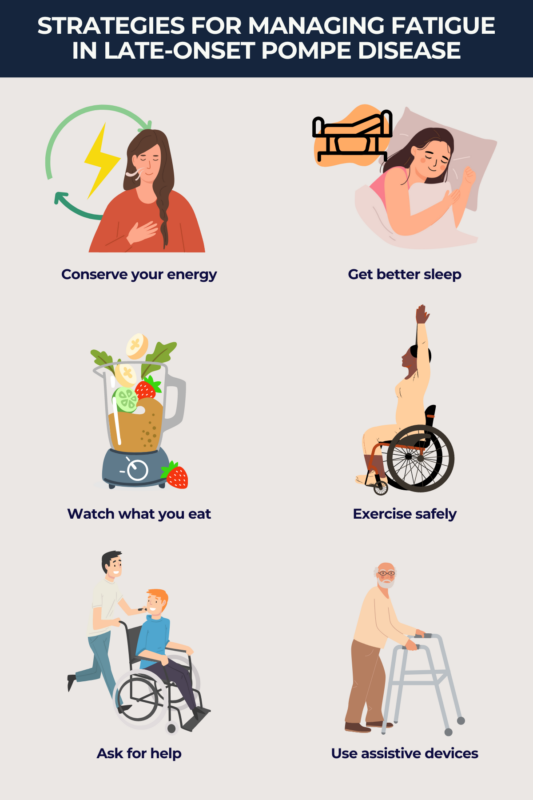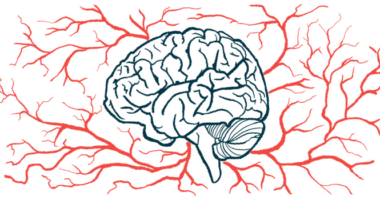How to manage fatigue when you have late-onset Pompe disease
Last updated April 8, 2024, by Susie Strachan

Fatigue is a common symptom of late-onset Pompe disease (LOPD). It can have an impact on being able to take part in daily activities and affect quality of life.
However, there are strategies you can try to manage fatigue and help maintain your overall energy levels.
These include working with your LOPD healthcare team on a personalized approach to medication and other therapies, using assistive devices, and relying on your support network when needed.
How LOPD affects muscles
LOPD is caused by mutations in the GAA gene that result in a buildup in cells of glycogen, a complex sugar molecule, which can impair muscle function.
Normally, glycogen is broken down to provide energy for muscles. But when someone has LOPD, the process doesn’t work properly. Glycogen builds up to harmful levels inside cells, especially those of the muscles, interfering with the energy supply needed for muscle movements.
As a result, you experience progressive muscle weakness and fatigue. Other LOPD symptoms such as difficulty breathing and heart problems also can contribute to both physical and mental fatigue.
You may also have fatigue as a side effect of some medications prescribed to help with LOPD management, such as enzyme replacement therapy.
What does LOPD fatigue feel like?
Fatigue feels different for every person living with LOPD. Generally, it is described as a persistent and overwhelming sense of tiredness or exhaustion that goes well beyond normal tiredness.
People who have LOPD say fatigue is one of their most debilitating symptoms, alongside muscle weakness, pain, and difficulty breathing. It’s also something that affects their social and professional lives, due to the need to rest.
Physically, chronic fatigue can make muscles feel weak even after minimal exertion. Sometimes, the tiredness is not limited to one or a few areas but is throughout the entire body. Fatigue-related exhaustion also can contribute to feelings of lightheadedness or dizziness that sometimes lead to nausea and even affect your ability to concentrate.
The impact and effects of fatigue
LOPD fatigue can have a big impact on your life. Overwhelming fatigue may make mobility difficult, increase your risk of falling, and interfere with taking part in social activities or being productive at school or work.
You may feel like it takes significantly more time and effort than usual to do tasks that were once routine. Fatigue may worsen as the day progresses.
Mentally, you may have difficulty finding the energy to get moving. You also may notice problems with your memory.

Fatigue may also make it harder for you to stick with your LOPD treatment if you are struggling with mental health problems that can develop when living with a chronic illness.
The emotional impact of fatigue also may stop you from enjoying things you usually like to do.
Fatigue may lead to:
- muscle weakness and reduced physical stamina, making it hard to walk, climb stairs, or lift objects
- increased reliance on assistive devices or mobility aids, limiting your independence
- difficulty doing exercises prescribed to you by your care team
- decreased interest in hobbies or getting together with friends.
Energy conservation techniques
The first step in learning how to conserve energy when living with a rare disease is being aware of your energy levels, limitations, and triggers for fatigue. It can help you figure out what times of the day your energy is most likely at its highest or lowest and what is likely to drain your energy more quickly.
You can then focus on your essential or high-priority tasks while delegating, postponing, or doing less critical tasks in stages.
If you can spread out activities and tasks throughout your day, take regular breaks, and avoid overexertion, it may help you maintain a steady, sustainable pace rather than alternating between high activity and being exhausted.
For more tips on how to manage fatigue with LOPD, consult an occupational or physical therapist, or speak with other members of your LOPD healthcare team.
The importance of sleep
Sleeping gives your body a chance to rest, repair, and recover. But when LOPD weakens the muscle of your diaphragm, it can cause breathing problems that disrupt sleep.
When your diaphragm is weakened, it may not contract and expand effectively during breathing, leading to inefficient airflow into your lungs. Oxygen levels in your blood may decrease and carbon dioxide levels may increase, especially during sleep when respiratory muscle activity naturally slows down.
This can lead to frequent awakenings, shallow breathing, or periods during which your breathing pauses for a short time (sleep apnea). These disruptions can lead to poor sleep quality, daytime sleepiness, and fatigue.
Your healthcare provider may want you to try noninvasive ventilation, such as a BiPap machine that delivers pressurized air to your airway through a mask worn over your nose or nose and mouth during sleep. The machine helps keep airways open.
You may also need to learn how to clear mucus from your airways and lungs, which can build up when respiratory muscles are not strong enough. There are certain techniques you can try to help do this or use an airway clearance device. Clearing your lungs before bedtime may reduce respiratory disturbances such as sleep apnea.
Other solutions to LOPD sleeping problems are:
- elevating the head of the bed slightly to reduce respiratory symptoms
- using pillows or cushions to help alleviate pain from any pressure points
- adjusting the time you take any medications that may affect sleep.
Exercise
Regular exercise may increase energy levels and muscle strength and reduce fatigue.
Exercise may also help with mobility and balance, maintain joint flexibility, and prevent contractures or stiffness.
Talk with your doctor or physical therapist about an exercise program that addresses your physical abilities. An LOPD exercise plan should focus on gradual progression, proper technique, and monitoring for signs of fatigue or overexertion.
There are exercises that are considered safer for someone with LOPD, such as using a stationary bicycle. It’s also a good idea to rely on assistive devices when walking outdoors or on uneven surfaces.
Other exercises that can be beneficial for people with LOPD:
- Aerobic exercises, such as walking, cycling, or swimming, can increase your cardiovascular fitness and respiratory function.
- Resistance training with light weights or resistance bands strengthen weakened muscles.
- Flexibility exercises such as gentle stretching, yoga, tai chi, or Pilates may prevent stiffness and improve mobility.
- Balance and stability exercises improve balance, coordination, and awareness of body position, reducing the risk of falls.
The role of diet
Eating a nutritious diet can boost your energy levels and help manage fatigue.
While there is no specific diet for LOPD, there is some evidence that following a high-protein diet may decrease muscle loss and therefore potentially help with fatigue.
A good diet plan is one that includes lots of fruits, vegetables, and whole grains, while limiting processed foods that contain high amounts of sodium and unhealthy fats, sugary drinks, and too much caffeine and alcohol.
Progressive muscle weakness from LOPD in the mouth and throat may make food hard to chew and swallow, potentially causing aspiration, inhaling food or drink into your lungs. Weakened muscles in the stomach and intestines also may cause acid reflux, constipation, or other gastrointestinal issues.
If any of these are an issue, talk to a registered dietitian about ways to make food easier to eat and digest, and ask about other nutritional tips.
Coping mechanisms and support
Persistent feelings of fatigue can contribute to increased stress and anxiety.
Struggling to conserve energy and manage your LOPD symptoms while coping with daily tasks and responsibilities can worsen feelings of worry, including about your future.
Strategies for managing fatigue and promoting mental well-being include:
- pacing yourself
- practicing stress management techniques
- keeping up social connections
- trying mental health counseling or therapy
- engaging in self-care activities you find relaxing and enjoyable.
Some coping mechanisms might include:
- doing only essential tasks
- taking rest breaks as needed
- practicing meditation or doing deep breathing exercises
- reaching out to family members, friends, and other people with LOPD for emotional support and encouragement
- being open to new strategies such as using assistive devices to help you.
Whether online or in-person, joining an LOPD support group may boost your mental health by giving you an outlet for your feelings and frustrations.
Support groups also share knowledge and resources, as well as practical advice, tips, and coping strategies for managing daily life with LOPD, including fatigue.
Pompe Disease News is strictly a news and information website about the disease. It does not provide medical advice, diagnosis, or treatment. This content is not intended to be a substitute for professional medical advice, diagnosis, or treatment. Always seek the advice of your physician or other qualified health provider with any questions you may have regarding a medical condition. Never disregard professional medical advice or delay in seeking it because of something you have read on this website.




